Kaplan Business School: Organisational Behaviour Leadership Reflection
VerifiedAdded on 2022/08/13
|9
|1933
|10
Report
AI Summary
This report presents a student's self-reflection on their leadership skills within an organisational behaviour context. The paper begins with an introduction highlighting the importance of leadership and then provides a brief review of the student's leadership attributes based on personality tests and past experiences. The core of the report focuses on a critical analysis of four key aspects of leadership: conflict and negotiation, team motivation, personal growth, and organisational growth. The student identifies strengths such as self-management, optimism, and empathetic attitude, while also acknowledging weaknesses like over-involvement and a focus on quality checks. The analysis includes recommendations for improvement in areas such as technical knowledge, market dynamics understanding, and the balance between quality control and team autonomy. The report concludes by emphasizing the crucial role of leadership and suggesting how the student can leverage their strengths and address weaknesses to achieve career sustainability. References to relevant literature are also included.
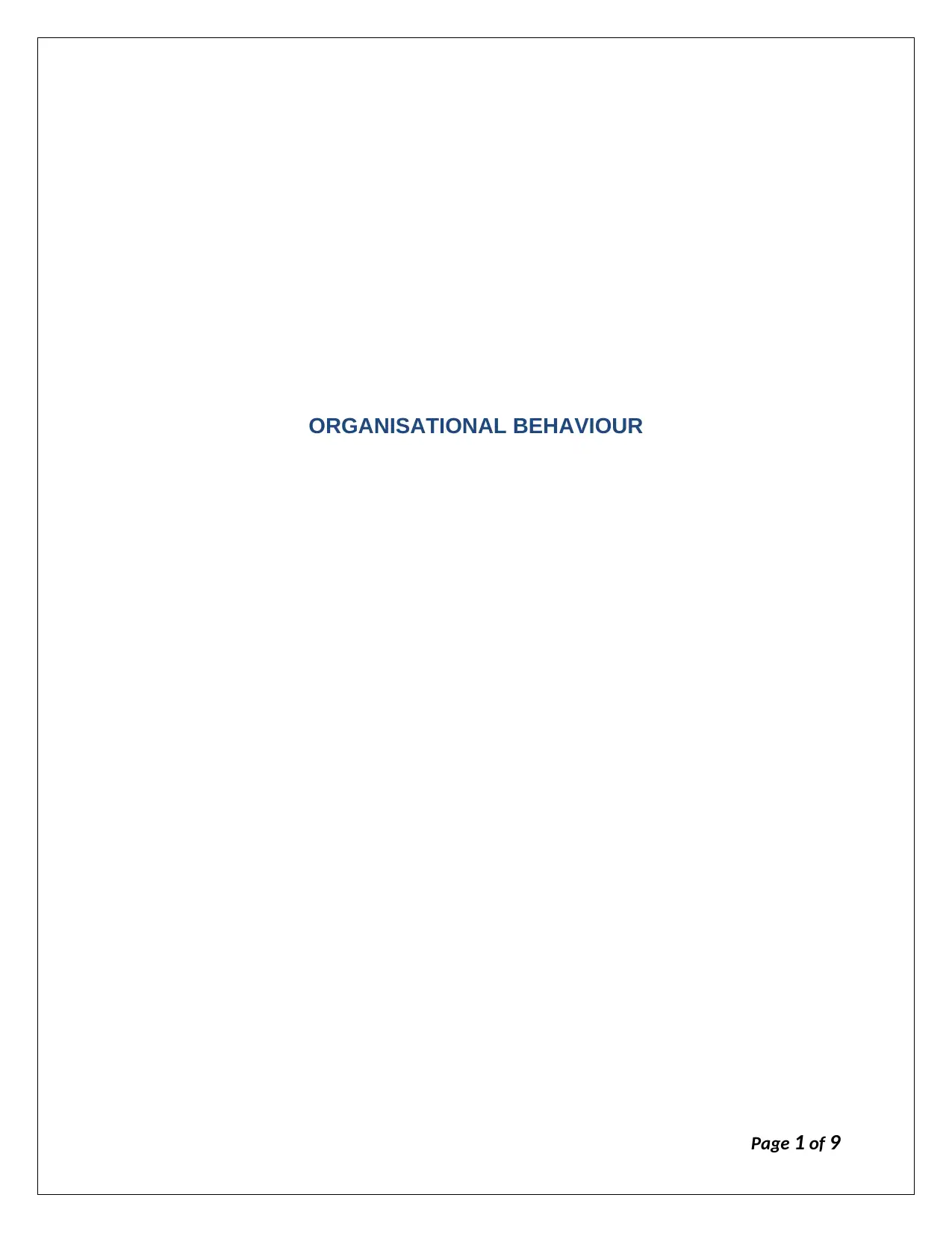
ORGANISATIONAL BEHAVIOUR
Page 1 of 9
Page 1 of 9
Paraphrase This Document
Need a fresh take? Get an instant paraphrase of this document with our AI Paraphraser
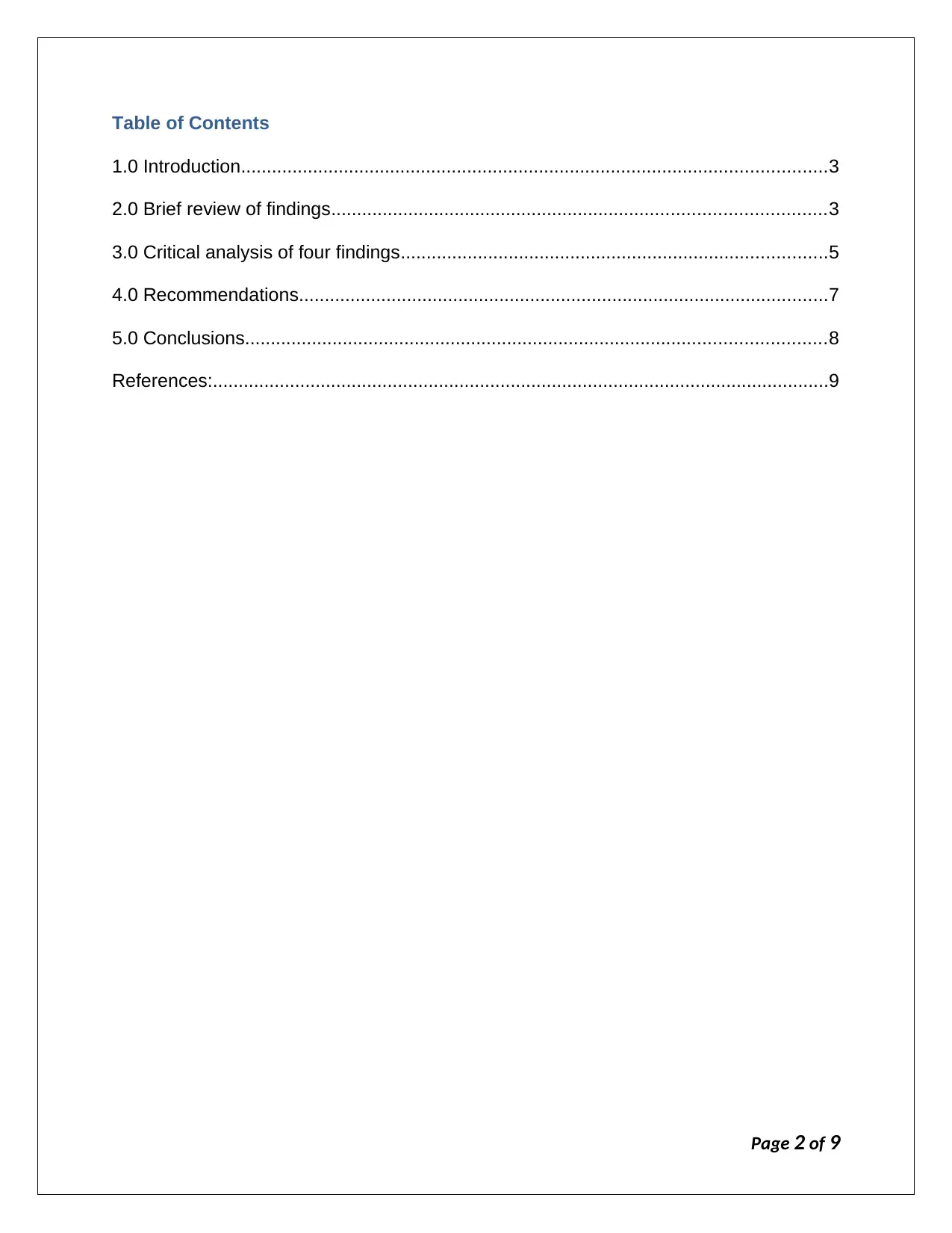
Table of Contents
1.0 Introduction..................................................................................................................3
2.0 Brief review of findings................................................................................................3
3.0 Critical analysis of four findings...................................................................................5
4.0 Recommendations.......................................................................................................7
5.0 Conclusions.................................................................................................................8
References:........................................................................................................................9
Page 2 of 9
1.0 Introduction..................................................................................................................3
2.0 Brief review of findings................................................................................................3
3.0 Critical analysis of four findings...................................................................................5
4.0 Recommendations.......................................................................................................7
5.0 Conclusions.................................................................................................................8
References:........................................................................................................................9
Page 2 of 9
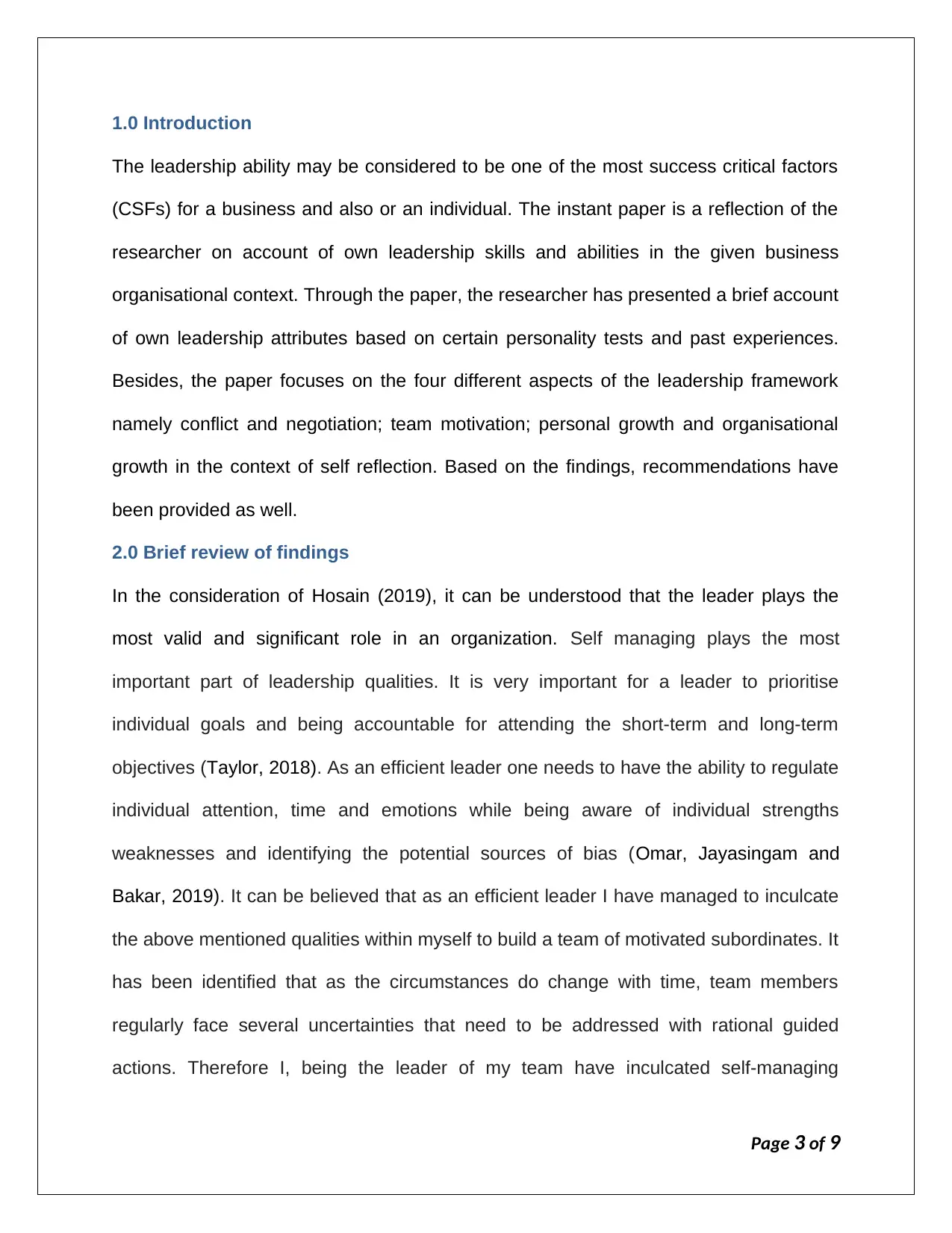
1.0 Introduction
The leadership ability may be considered to be one of the most success critical factors
(CSFs) for a business and also or an individual. The instant paper is a reflection of the
researcher on account of own leadership skills and abilities in the given business
organisational context. Through the paper, the researcher has presented a brief account
of own leadership attributes based on certain personality tests and past experiences.
Besides, the paper focuses on the four different aspects of the leadership framework
namely conflict and negotiation; team motivation; personal growth and organisational
growth in the context of self reflection. Based on the findings, recommendations have
been provided as well.
2.0 Brief review of findings
In the consideration of Hosain (2019), it can be understood that the leader plays the
most valid and significant role in an organization. Self managing plays the most
important part of leadership qualities. It is very important for a leader to prioritise
individual goals and being accountable for attending the short-term and long-term
objectives (Taylor, 2018). As an efficient leader one needs to have the ability to regulate
individual attention, time and emotions while being aware of individual strengths
weaknesses and identifying the potential sources of bias (Omar, Jayasingam and
Bakar, 2019). It can be believed that as an efficient leader I have managed to inculcate
the above mentioned qualities within myself to build a team of motivated subordinates. It
has been identified that as the circumstances do change with time, team members
regularly face several uncertainties that need to be addressed with rational guided
actions. Therefore I, being the leader of my team have inculcated self-managing
Page 3 of 9
The leadership ability may be considered to be one of the most success critical factors
(CSFs) for a business and also or an individual. The instant paper is a reflection of the
researcher on account of own leadership skills and abilities in the given business
organisational context. Through the paper, the researcher has presented a brief account
of own leadership attributes based on certain personality tests and past experiences.
Besides, the paper focuses on the four different aspects of the leadership framework
namely conflict and negotiation; team motivation; personal growth and organisational
growth in the context of self reflection. Based on the findings, recommendations have
been provided as well.
2.0 Brief review of findings
In the consideration of Hosain (2019), it can be understood that the leader plays the
most valid and significant role in an organization. Self managing plays the most
important part of leadership qualities. It is very important for a leader to prioritise
individual goals and being accountable for attending the short-term and long-term
objectives (Taylor, 2018). As an efficient leader one needs to have the ability to regulate
individual attention, time and emotions while being aware of individual strengths
weaknesses and identifying the potential sources of bias (Omar, Jayasingam and
Bakar, 2019). It can be believed that as an efficient leader I have managed to inculcate
the above mentioned qualities within myself to build a team of motivated subordinates. It
has been identified that as the circumstances do change with time, team members
regularly face several uncertainties that need to be addressed with rational guided
actions. Therefore I, being the leader of my team have inculcated self-managing
Page 3 of 9
⊘ This is a preview!⊘
Do you want full access?
Subscribe today to unlock all pages.

Trusted by 1+ million students worldwide
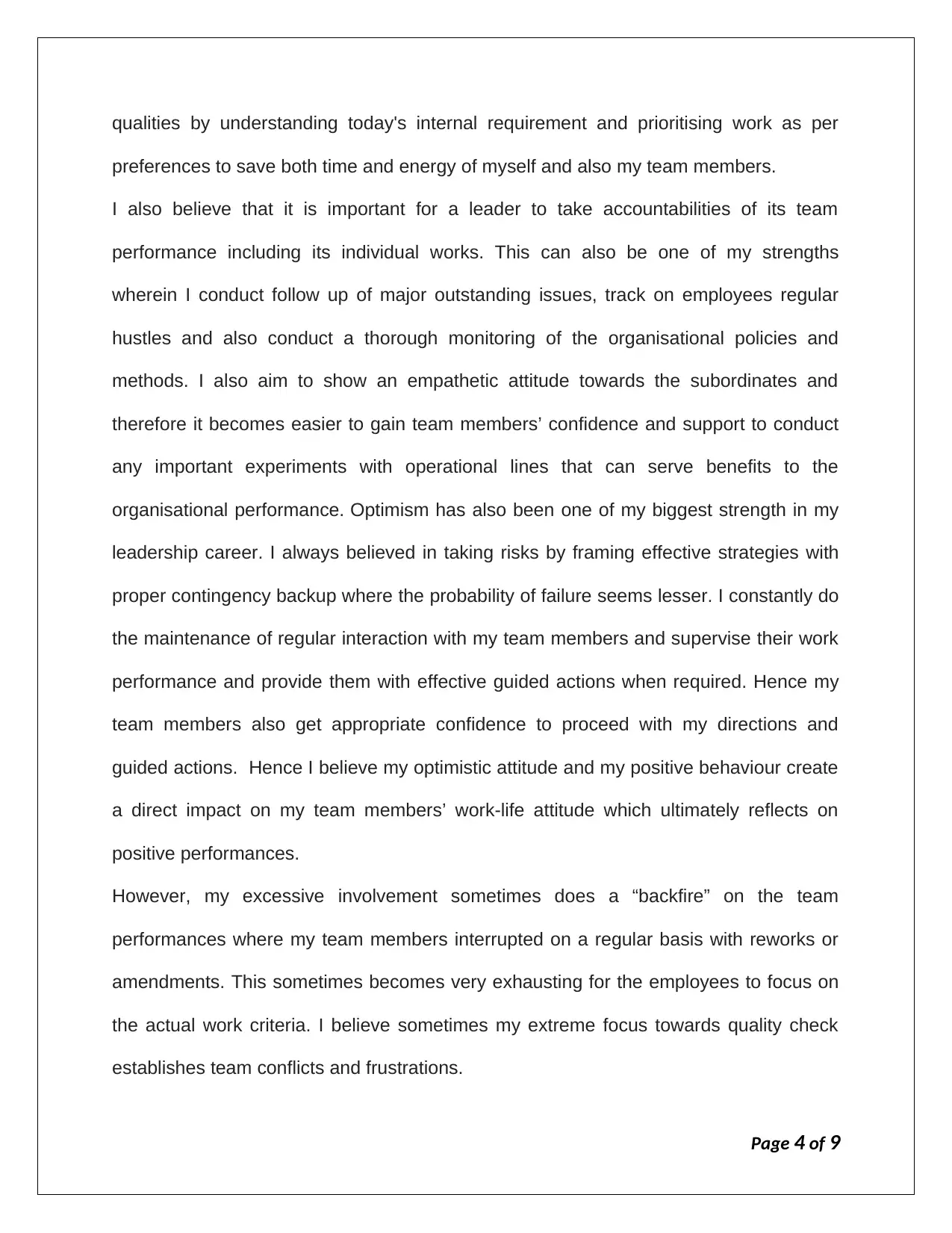
qualities by understanding today's internal requirement and prioritising work as per
preferences to save both time and energy of myself and also my team members.
I also believe that it is important for a leader to take accountabilities of its team
performance including its individual works. This can also be one of my strengths
wherein I conduct follow up of major outstanding issues, track on employees regular
hustles and also conduct a thorough monitoring of the organisational policies and
methods. I also aim to show an empathetic attitude towards the subordinates and
therefore it becomes easier to gain team members’ confidence and support to conduct
any important experiments with operational lines that can serve benefits to the
organisational performance. Optimism has also been one of my biggest strength in my
leadership career. I always believed in taking risks by framing effective strategies with
proper contingency backup where the probability of failure seems lesser. I constantly do
the maintenance of regular interaction with my team members and supervise their work
performance and provide them with effective guided actions when required. Hence my
team members also get appropriate confidence to proceed with my directions and
guided actions. Hence I believe my optimistic attitude and my positive behaviour create
a direct impact on my team members’ work-life attitude which ultimately reflects on
positive performances.
However, my excessive involvement sometimes does a “backfire” on the team
performances where my team members interrupted on a regular basis with reworks or
amendments. This sometimes becomes very exhausting for the employees to focus on
the actual work criteria. I believe sometimes my extreme focus towards quality check
establishes team conflicts and frustrations.
Page 4 of 9
preferences to save both time and energy of myself and also my team members.
I also believe that it is important for a leader to take accountabilities of its team
performance including its individual works. This can also be one of my strengths
wherein I conduct follow up of major outstanding issues, track on employees regular
hustles and also conduct a thorough monitoring of the organisational policies and
methods. I also aim to show an empathetic attitude towards the subordinates and
therefore it becomes easier to gain team members’ confidence and support to conduct
any important experiments with operational lines that can serve benefits to the
organisational performance. Optimism has also been one of my biggest strength in my
leadership career. I always believed in taking risks by framing effective strategies with
proper contingency backup where the probability of failure seems lesser. I constantly do
the maintenance of regular interaction with my team members and supervise their work
performance and provide them with effective guided actions when required. Hence my
team members also get appropriate confidence to proceed with my directions and
guided actions. Hence I believe my optimistic attitude and my positive behaviour create
a direct impact on my team members’ work-life attitude which ultimately reflects on
positive performances.
However, my excessive involvement sometimes does a “backfire” on the team
performances where my team members interrupted on a regular basis with reworks or
amendments. This sometimes becomes very exhausting for the employees to focus on
the actual work criteria. I believe sometimes my extreme focus towards quality check
establishes team conflicts and frustrations.
Page 4 of 9
Paraphrase This Document
Need a fresh take? Get an instant paraphrase of this document with our AI Paraphraser
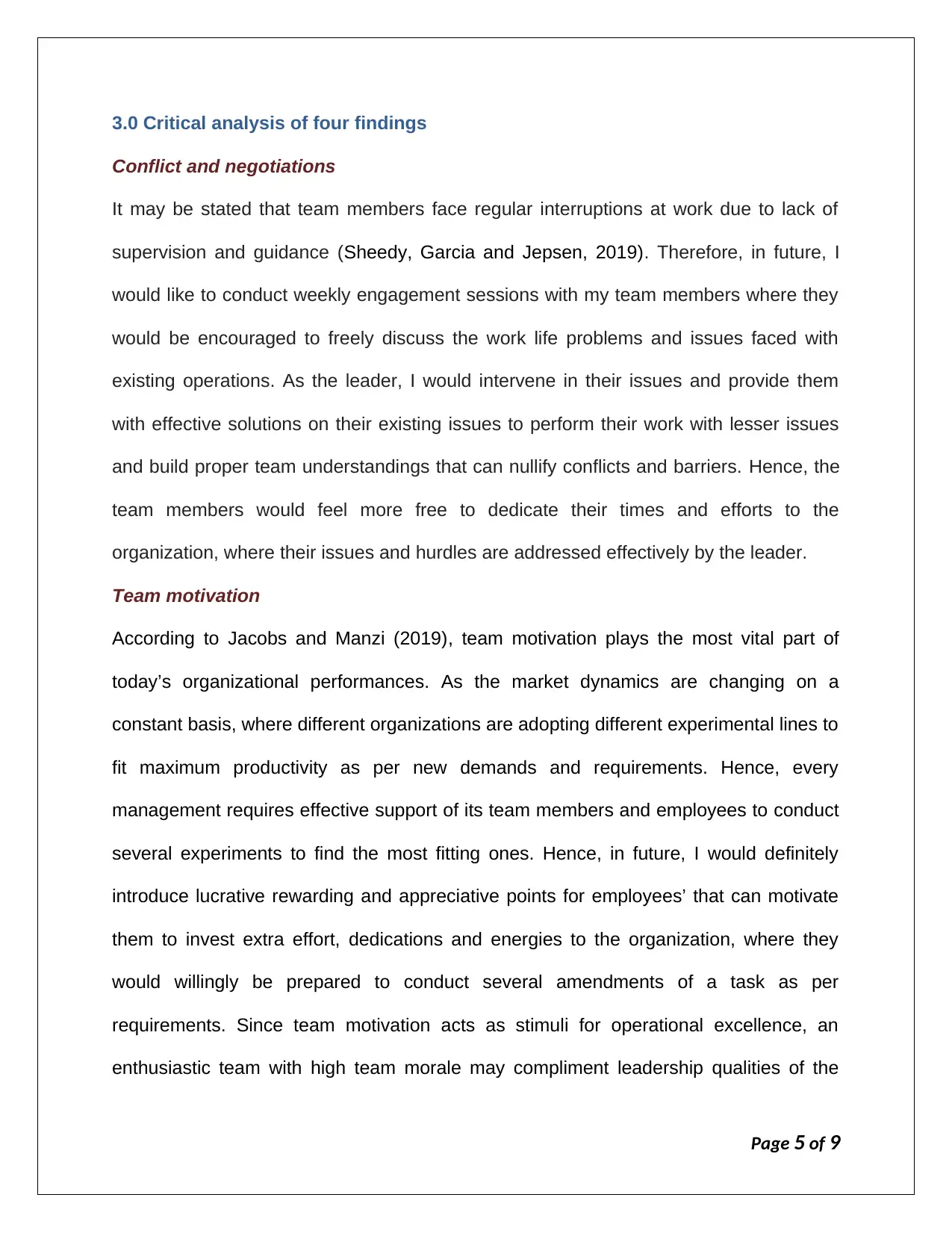
3.0 Critical analysis of four findings
Conflict and negotiations
It may be stated that team members face regular interruptions at work due to lack of
supervision and guidance (Sheedy, Garcia and Jepsen, 2019). Therefore, in future, I
would like to conduct weekly engagement sessions with my team members where they
would be encouraged to freely discuss the work life problems and issues faced with
existing operations. As the leader, I would intervene in their issues and provide them
with effective solutions on their existing issues to perform their work with lesser issues
and build proper team understandings that can nullify conflicts and barriers. Hence, the
team members would feel more free to dedicate their times and efforts to the
organization, where their issues and hurdles are addressed effectively by the leader.
Team motivation
According to Jacobs and Manzi (2019), team motivation plays the most vital part of
today’s organizational performances. As the market dynamics are changing on a
constant basis, where different organizations are adopting different experimental lines to
fit maximum productivity as per new demands and requirements. Hence, every
management requires effective support of its team members and employees to conduct
several experiments to find the most fitting ones. Hence, in future, I would definitely
introduce lucrative rewarding and appreciative points for employees’ that can motivate
them to invest extra effort, dedications and energies to the organization, where they
would willingly be prepared to conduct several amendments of a task as per
requirements. Since team motivation acts as stimuli for operational excellence, an
enthusiastic team with high team morale may compliment leadership qualities of the
Page 5 of 9
Conflict and negotiations
It may be stated that team members face regular interruptions at work due to lack of
supervision and guidance (Sheedy, Garcia and Jepsen, 2019). Therefore, in future, I
would like to conduct weekly engagement sessions with my team members where they
would be encouraged to freely discuss the work life problems and issues faced with
existing operations. As the leader, I would intervene in their issues and provide them
with effective solutions on their existing issues to perform their work with lesser issues
and build proper team understandings that can nullify conflicts and barriers. Hence, the
team members would feel more free to dedicate their times and efforts to the
organization, where their issues and hurdles are addressed effectively by the leader.
Team motivation
According to Jacobs and Manzi (2019), team motivation plays the most vital part of
today’s organizational performances. As the market dynamics are changing on a
constant basis, where different organizations are adopting different experimental lines to
fit maximum productivity as per new demands and requirements. Hence, every
management requires effective support of its team members and employees to conduct
several experiments to find the most fitting ones. Hence, in future, I would definitely
introduce lucrative rewarding and appreciative points for employees’ that can motivate
them to invest extra effort, dedications and energies to the organization, where they
would willingly be prepared to conduct several amendments of a task as per
requirements. Since team motivation acts as stimuli for operational excellence, an
enthusiastic team with high team morale may compliment leadership qualities of the
Page 5 of 9
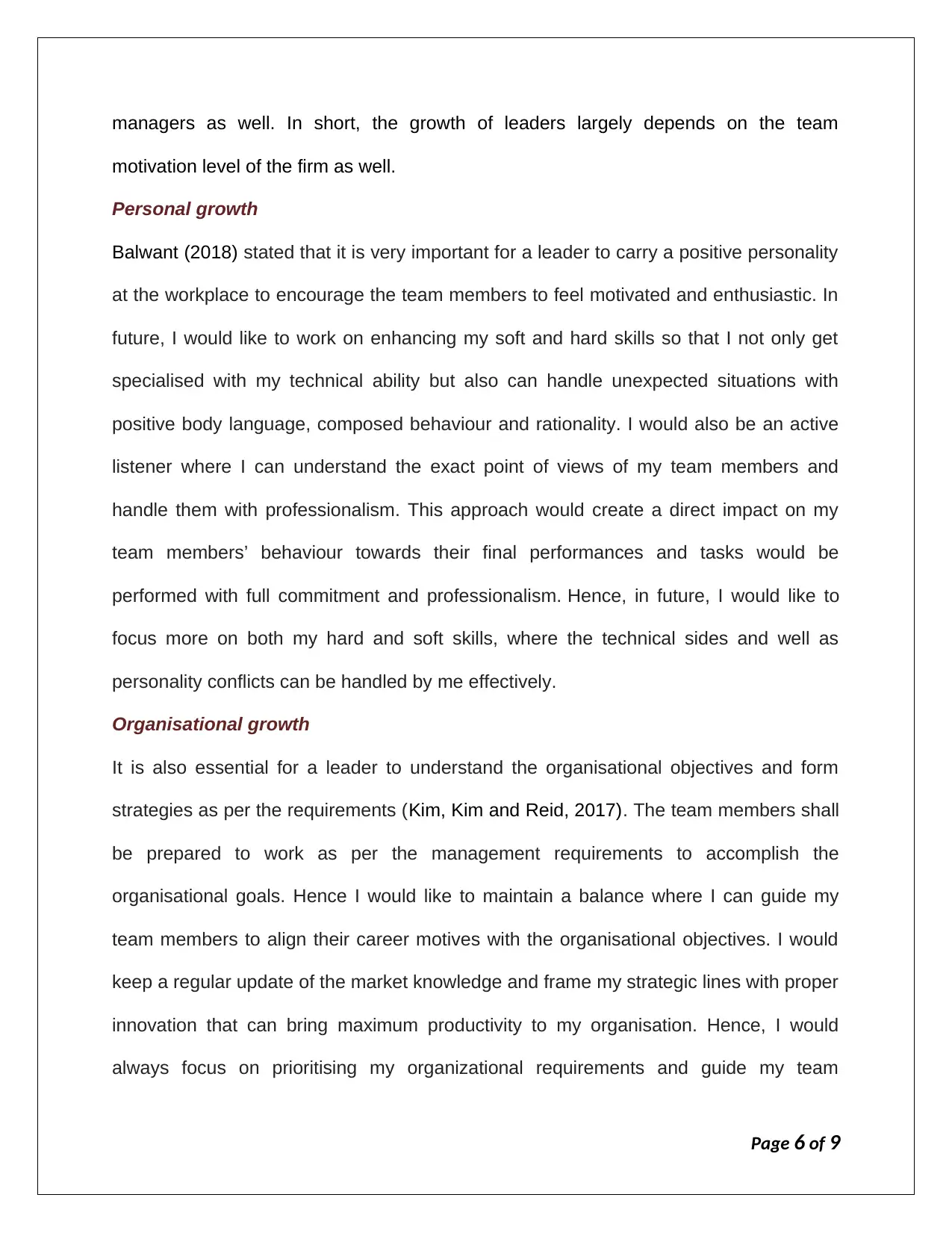
managers as well. In short, the growth of leaders largely depends on the team
motivation level of the firm as well.
Personal growth
Balwant (2018) stated that it is very important for a leader to carry a positive personality
at the workplace to encourage the team members to feel motivated and enthusiastic. In
future, I would like to work on enhancing my soft and hard skills so that I not only get
specialised with my technical ability but also can handle unexpected situations with
positive body language, composed behaviour and rationality. I would also be an active
listener where I can understand the exact point of views of my team members and
handle them with professionalism. This approach would create a direct impact on my
team members’ behaviour towards their final performances and tasks would be
performed with full commitment and professionalism. Hence, in future, I would like to
focus more on both my hard and soft skills, where the technical sides and well as
personality conflicts can be handled by me effectively.
Organisational growth
It is also essential for a leader to understand the organisational objectives and form
strategies as per the requirements (Kim, Kim and Reid, 2017). The team members shall
be prepared to work as per the management requirements to accomplish the
organisational goals. Hence I would like to maintain a balance where I can guide my
team members to align their career motives with the organisational objectives. I would
keep a regular update of the market knowledge and frame my strategic lines with proper
innovation that can bring maximum productivity to my organisation. Hence, I would
always focus on prioritising my organizational requirements and guide my team
Page 6 of 9
motivation level of the firm as well.
Personal growth
Balwant (2018) stated that it is very important for a leader to carry a positive personality
at the workplace to encourage the team members to feel motivated and enthusiastic. In
future, I would like to work on enhancing my soft and hard skills so that I not only get
specialised with my technical ability but also can handle unexpected situations with
positive body language, composed behaviour and rationality. I would also be an active
listener where I can understand the exact point of views of my team members and
handle them with professionalism. This approach would create a direct impact on my
team members’ behaviour towards their final performances and tasks would be
performed with full commitment and professionalism. Hence, in future, I would like to
focus more on both my hard and soft skills, where the technical sides and well as
personality conflicts can be handled by me effectively.
Organisational growth
It is also essential for a leader to understand the organisational objectives and form
strategies as per the requirements (Kim, Kim and Reid, 2017). The team members shall
be prepared to work as per the management requirements to accomplish the
organisational goals. Hence I would like to maintain a balance where I can guide my
team members to align their career motives with the organisational objectives. I would
keep a regular update of the market knowledge and frame my strategic lines with proper
innovation that can bring maximum productivity to my organisation. Hence, I would
always focus on prioritising my organizational requirements and guide my team
Page 6 of 9
⊘ This is a preview!⊘
Do you want full access?
Subscribe today to unlock all pages.

Trusted by 1+ million students worldwide
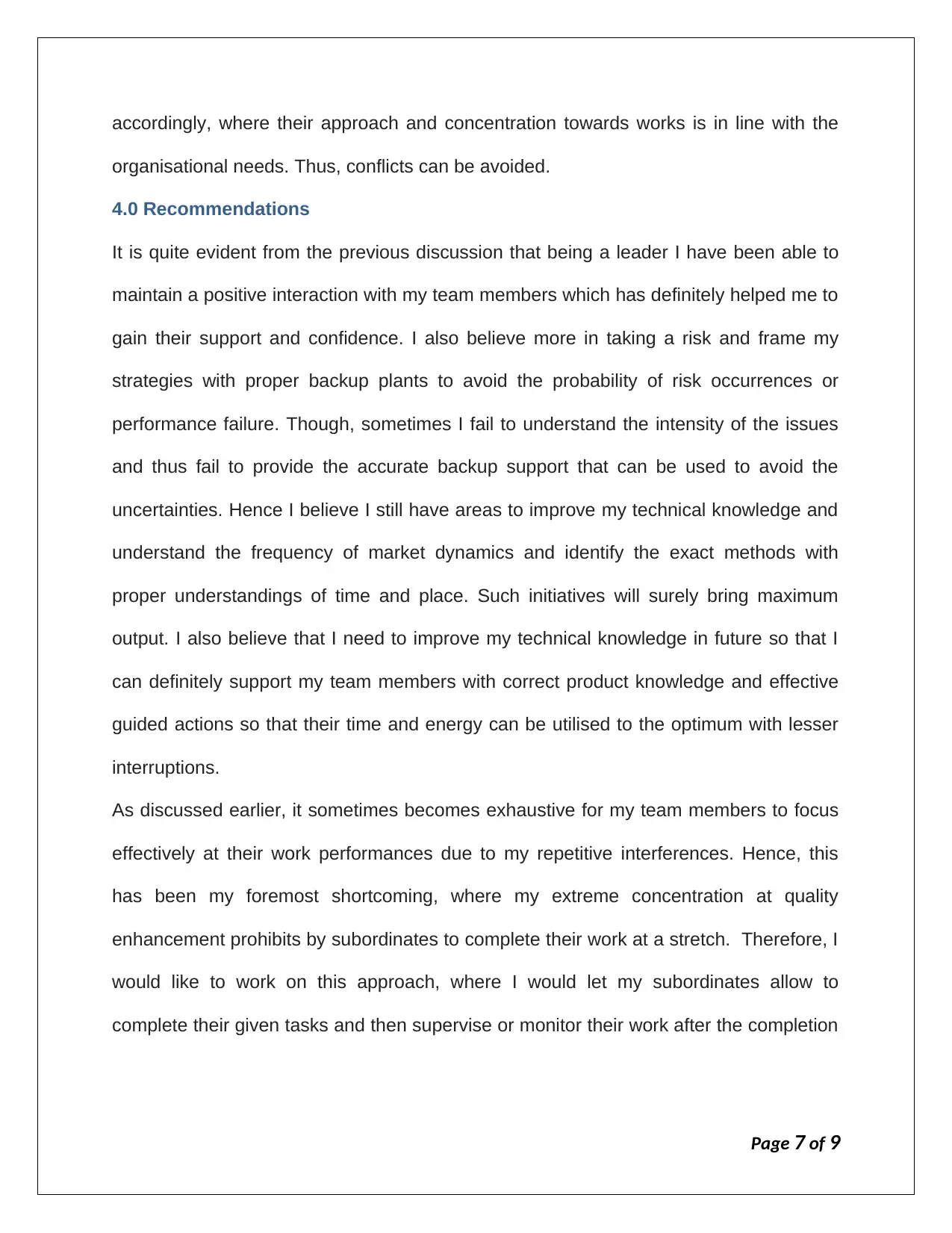
accordingly, where their approach and concentration towards works is in line with the
organisational needs. Thus, conflicts can be avoided.
4.0 Recommendations
It is quite evident from the previous discussion that being a leader I have been able to
maintain a positive interaction with my team members which has definitely helped me to
gain their support and confidence. I also believe more in taking a risk and frame my
strategies with proper backup plants to avoid the probability of risk occurrences or
performance failure. Though, sometimes I fail to understand the intensity of the issues
and thus fail to provide the accurate backup support that can be used to avoid the
uncertainties. Hence I believe I still have areas to improve my technical knowledge and
understand the frequency of market dynamics and identify the exact methods with
proper understandings of time and place. Such initiatives will surely bring maximum
output. I also believe that I need to improve my technical knowledge in future so that I
can definitely support my team members with correct product knowledge and effective
guided actions so that their time and energy can be utilised to the optimum with lesser
interruptions.
As discussed earlier, it sometimes becomes exhaustive for my team members to focus
effectively at their work performances due to my repetitive interferences. Hence, this
has been my foremost shortcoming, where my extreme concentration at quality
enhancement prohibits by subordinates to complete their work at a stretch. Therefore, I
would like to work on this approach, where I would let my subordinates allow to
complete their given tasks and then supervise or monitor their work after the completion
Page 7 of 9
organisational needs. Thus, conflicts can be avoided.
4.0 Recommendations
It is quite evident from the previous discussion that being a leader I have been able to
maintain a positive interaction with my team members which has definitely helped me to
gain their support and confidence. I also believe more in taking a risk and frame my
strategies with proper backup plants to avoid the probability of risk occurrences or
performance failure. Though, sometimes I fail to understand the intensity of the issues
and thus fail to provide the accurate backup support that can be used to avoid the
uncertainties. Hence I believe I still have areas to improve my technical knowledge and
understand the frequency of market dynamics and identify the exact methods with
proper understandings of time and place. Such initiatives will surely bring maximum
output. I also believe that I need to improve my technical knowledge in future so that I
can definitely support my team members with correct product knowledge and effective
guided actions so that their time and energy can be utilised to the optimum with lesser
interruptions.
As discussed earlier, it sometimes becomes exhaustive for my team members to focus
effectively at their work performances due to my repetitive interferences. Hence, this
has been my foremost shortcoming, where my extreme concentration at quality
enhancement prohibits by subordinates to complete their work at a stretch. Therefore, I
would like to work on this approach, where I would let my subordinates allow to
complete their given tasks and then supervise or monitor their work after the completion
Page 7 of 9
Paraphrase This Document
Need a fresh take? Get an instant paraphrase of this document with our AI Paraphraser
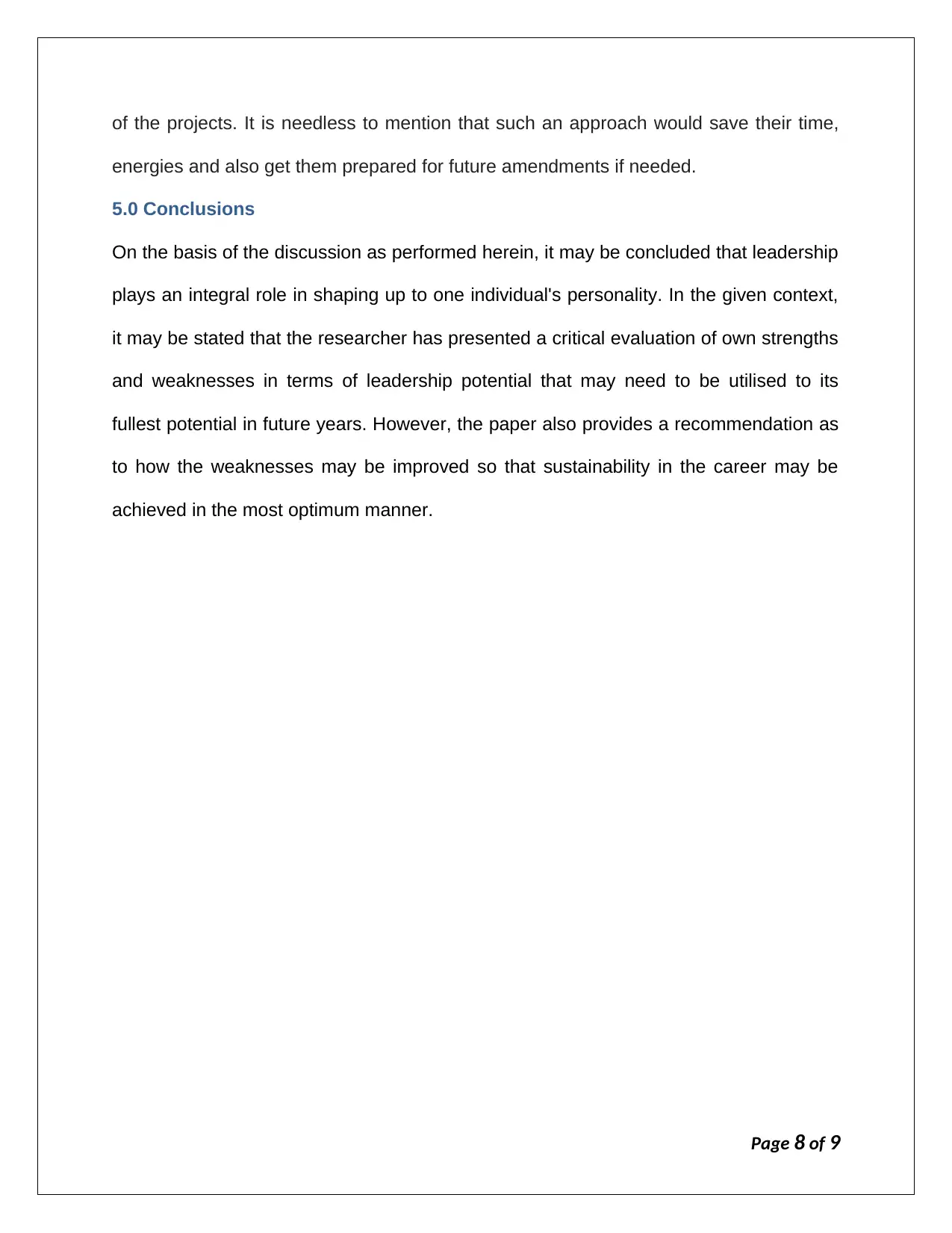
of the projects. It is needless to mention that such an approach would save their time,
energies and also get them prepared for future amendments if needed.
5.0 Conclusions
On the basis of the discussion as performed herein, it may be concluded that leadership
plays an integral role in shaping up to one individual's personality. In the given context,
it may be stated that the researcher has presented a critical evaluation of own strengths
and weaknesses in terms of leadership potential that may need to be utilised to its
fullest potential in future years. However, the paper also provides a recommendation as
to how the weaknesses may be improved so that sustainability in the career may be
achieved in the most optimum manner.
Page 8 of 9
energies and also get them prepared for future amendments if needed.
5.0 Conclusions
On the basis of the discussion as performed herein, it may be concluded that leadership
plays an integral role in shaping up to one individual's personality. In the given context,
it may be stated that the researcher has presented a critical evaluation of own strengths
and weaknesses in terms of leadership potential that may need to be utilised to its
fullest potential in future years. However, the paper also provides a recommendation as
to how the weaknesses may be improved so that sustainability in the career may be
achieved in the most optimum manner.
Page 8 of 9
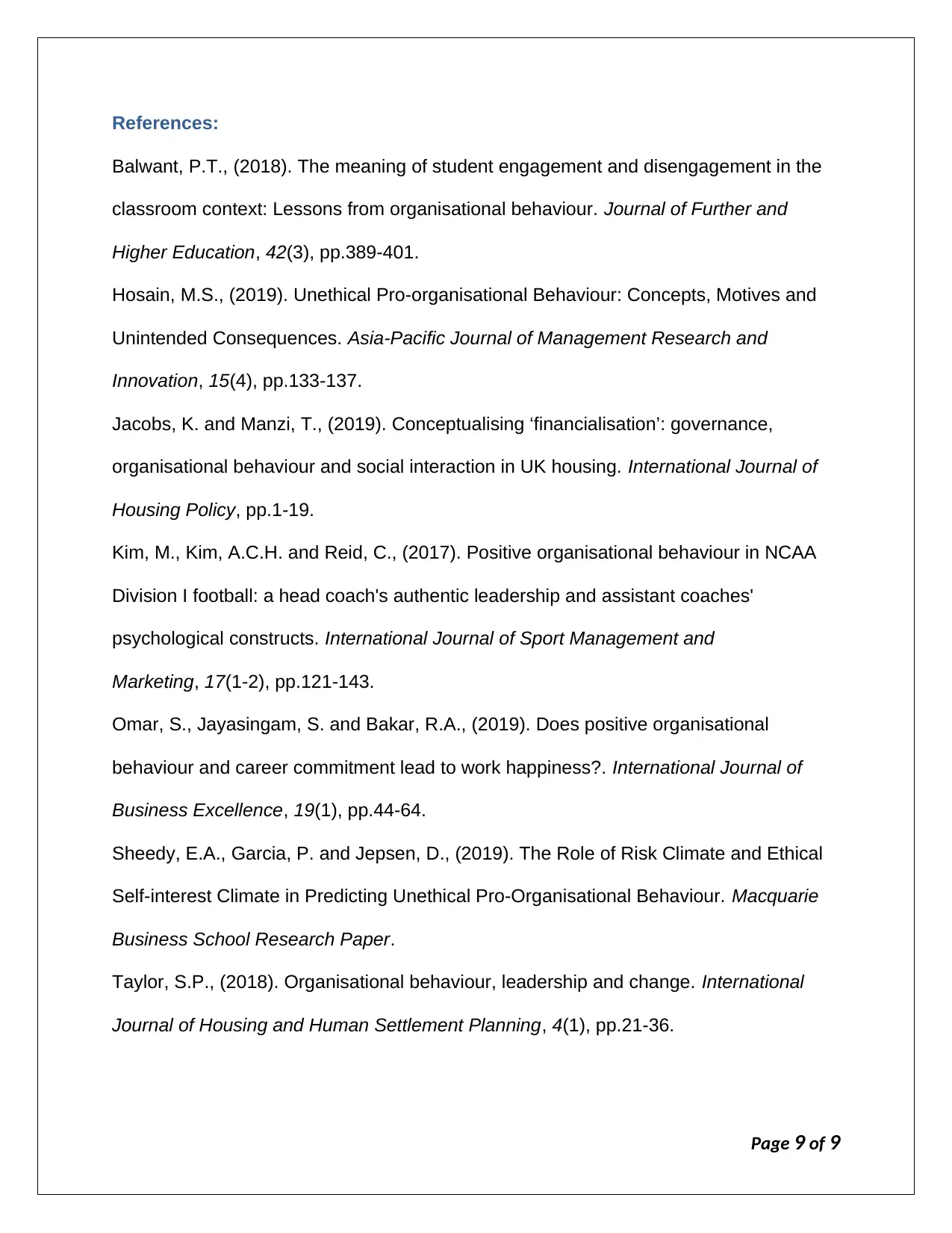
References:
Balwant, P.T., (2018). The meaning of student engagement and disengagement in the
classroom context: Lessons from organisational behaviour. Journal of Further and
Higher Education, 42(3), pp.389-401.
Hosain, M.S., (2019). Unethical Pro-organisational Behaviour: Concepts, Motives and
Unintended Consequences. Asia-Pacific Journal of Management Research and
Innovation, 15(4), pp.133-137.
Jacobs, K. and Manzi, T., (2019). Conceptualising ‘financialisation’: governance,
organisational behaviour and social interaction in UK housing. International Journal of
Housing Policy, pp.1-19.
Kim, M., Kim, A.C.H. and Reid, C., (2017). Positive organisational behaviour in NCAA
Division I football: a head coach's authentic leadership and assistant coaches'
psychological constructs. International Journal of Sport Management and
Marketing, 17(1-2), pp.121-143.
Omar, S., Jayasingam, S. and Bakar, R.A., (2019). Does positive organisational
behaviour and career commitment lead to work happiness?. International Journal of
Business Excellence, 19(1), pp.44-64.
Sheedy, E.A., Garcia, P. and Jepsen, D., (2019). The Role of Risk Climate and Ethical
Self-interest Climate in Predicting Unethical Pro-Organisational Behaviour. Macquarie
Business School Research Paper.
Taylor, S.P., (2018). Organisational behaviour, leadership and change. International
Journal of Housing and Human Settlement Planning, 4(1), pp.21-36.
Page 9 of 9
Balwant, P.T., (2018). The meaning of student engagement and disengagement in the
classroom context: Lessons from organisational behaviour. Journal of Further and
Higher Education, 42(3), pp.389-401.
Hosain, M.S., (2019). Unethical Pro-organisational Behaviour: Concepts, Motives and
Unintended Consequences. Asia-Pacific Journal of Management Research and
Innovation, 15(4), pp.133-137.
Jacobs, K. and Manzi, T., (2019). Conceptualising ‘financialisation’: governance,
organisational behaviour and social interaction in UK housing. International Journal of
Housing Policy, pp.1-19.
Kim, M., Kim, A.C.H. and Reid, C., (2017). Positive organisational behaviour in NCAA
Division I football: a head coach's authentic leadership and assistant coaches'
psychological constructs. International Journal of Sport Management and
Marketing, 17(1-2), pp.121-143.
Omar, S., Jayasingam, S. and Bakar, R.A., (2019). Does positive organisational
behaviour and career commitment lead to work happiness?. International Journal of
Business Excellence, 19(1), pp.44-64.
Sheedy, E.A., Garcia, P. and Jepsen, D., (2019). The Role of Risk Climate and Ethical
Self-interest Climate in Predicting Unethical Pro-Organisational Behaviour. Macquarie
Business School Research Paper.
Taylor, S.P., (2018). Organisational behaviour, leadership and change. International
Journal of Housing and Human Settlement Planning, 4(1), pp.21-36.
Page 9 of 9
⊘ This is a preview!⊘
Do you want full access?
Subscribe today to unlock all pages.

Trusted by 1+ million students worldwide
1 out of 9
Related Documents
Your All-in-One AI-Powered Toolkit for Academic Success.
+13062052269
info@desklib.com
Available 24*7 on WhatsApp / Email
![[object Object]](/_next/static/media/star-bottom.7253800d.svg)
Unlock your academic potential
Copyright © 2020–2026 A2Z Services. All Rights Reserved. Developed and managed by ZUCOL.





